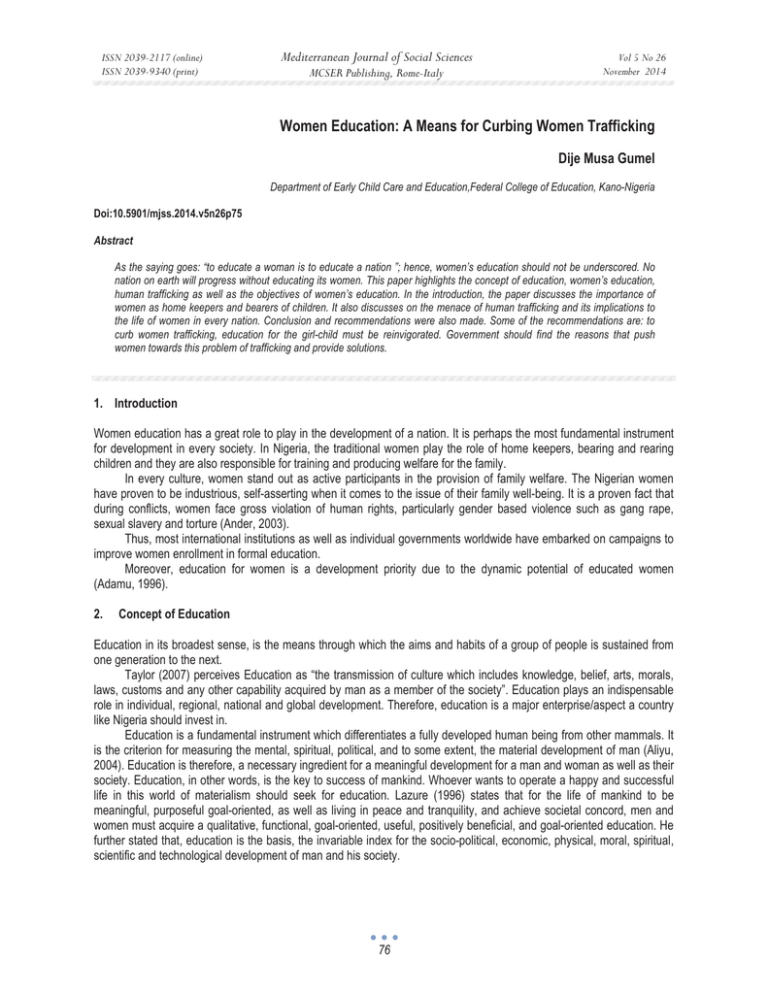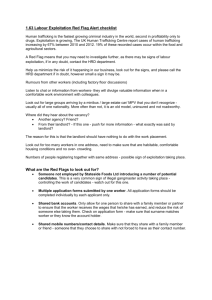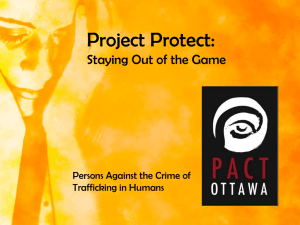
ISSN 2039-2117 (online)
ISSN 2039-9340 (print)
Mediterranean Journal of Social Sciences
MCSER Publishing, Rome-Italy
Vol 5 No 26
November 2014
Women Education: A Means for Curbing Women Trafficking
Dije Musa Gumel
Department of Early Child Care and Education,Federal College of Education, Kano-Nigeria
Doi:10.5901/mjss.2014.v5n26p75
Abstract
As the saying goes: “to educate a woman is to educate a nation ”; hence, women’s education should not be underscored. No
nation on earth will progress without educating its women. This paper highlights the concept of education, women’s education,
human trafficking as well as the objectives of women’s education. In the introduction, the paper discusses the importance of
women as home keepers and bearers of children. It also discusses on the menace of human trafficking and its implications to
the life of women in every nation. Conclusion and recommendations were also made. Some of the recommendations are: to
curb women trafficking, education for the girl-child must be reinvigorated. Government should find the reasons that push
women towards this problem of trafficking and provide solutions.
1. Introduction
Women education has a great role to play in the development of a nation. It is perhaps the most fundamental instrument
for development in every society. In Nigeria, the traditional women play the role of home keepers, bearing and rearing
children and they are also responsible for training and producing welfare for the family.
In every culture, women stand out as active participants in the provision of family welfare. The Nigerian women
have proven to be industrious, self-asserting when it comes to the issue of their family well-being. It is a proven fact that
during conflicts, women face gross violation of human rights, particularly gender based violence such as gang rape,
sexual slavery and torture (Ander, 2003).
Thus, most international institutions as well as individual governments worldwide have embarked on campaigns to
improve women enrollment in formal education.
Moreover, education for women is a development priority due to the dynamic potential of educated women
(Adamu, 1996).
2.
Concept of Education
Education in its broadest sense, is the means through which the aims and habits of a group of people is sustained from
one generation to the next.
Taylor (2007) perceives Education as “the transmission of culture which includes knowledge, belief, arts, morals,
laws, customs and any other capability acquired by man as a member of the society”. Education plays an indispensable
role in individual, regional, national and global development. Therefore, education is a major enterprise/aspect a country
like Nigeria should invest in.
Education is a fundamental instrument which differentiates a fully developed human being from other mammals. It
is the criterion for measuring the mental, spiritual, political, and to some extent, the material development of man (Aliyu,
2004). Education is therefore, a necessary ingredient for a meaningful development for a man and woman as well as their
society. Education, in other words, is the key to success of mankind. Whoever wants to operate a happy and successful
life in this world of materialism should seek for education. Lazure (1996) states that for the life of mankind to be
meaningful, purposeful goal-oriented, as well as living in peace and tranquility, and achieve societal concord, men and
women must acquire a qualitative, functional, goal-oriented, useful, positively beneficial, and goal-oriented education. He
further stated that, education is the basis, the invariable index for the socio-political, economic, physical, moral, spiritual,
scientific and technological development of man and his society.
76
ISSN 2039-2117 (online)
ISSN 2039-9340 (print)
3.
Mediterranean Journal of Social Sciences
MCSER Publishing, Rome-Italy
Vol 5 No 26
November 2014
Concept of Women Education
According to Surra (1996), education is a potential ingredient for changing a woman’s life.
Allele (1994) believes that women education is that type of education received by women that would make them to
become aware of themselves and their capacity to exploit the environment. Women education is therefore, seen as a
process whereby women are given equal opportunities to knowledge, skills, job participation in the wider society which
help in nation building and better society. This type of education involves training in literacy and vocational skills to enable
them become functional in their society, especially their homes. Education will help the women to be aware of their rights
and ways to do things.
4.
Concept of Human Trafficking
Human trafficking is a serious crime and grave violation of human rights. Every year, thousands of men, women and
children fall into the hands of traffickers in their own countries and abroad. Almost every country in the world is affected
by trafficking, whether as a country of origin, transit or destination for victims.
Ibrahim (2002) presented human trafficking as the recruitment, transportation, transfer, harbouring or receipt of
persons by means of threat or use of force or coercion, of abduction of fraud vulnerability or the consent of a person
having control over another person for the purpose of exploitation.
Adedokun (2008) defined human trafficking as an illegal or immoral trading which involves slaves or human beings
for the purpose of material gain.
United Nations Office on Drug and Crimes (UNODC) defines human trafficking as trafficking in persons as the
recruitment, transportation, transfer, harboring or receipt of persons, by means of threat or use of force or other forms of
coercion, of abduction of fraud, deception of the abuse of power or of a position of vulnerability or of the giving or
receiving of payments or benefits to achieve the consent of a person for the purpose of exploitation. These exploitation
shall include prostitution, sexual exploitation, forced labour or services, slavery or practices similar to slavery, servitude or
the removal of organs.
5.
Concept of Women Trafficking
Trafficking in persons is an increasing problem that involves both sexual exploitation and labour exploitation of its victims.
Trafficking affects all regions and majority of countries in the world. Both men and women may be victims of trafficking,
but the primary victims are women and girls, the majority of whom are trafficked for the purpose of sexual exploitation.
Traffickers usually target women because they are affected most by poverty and discrimination, which are the factors that
impede their access to employment, educational opportunities and other resources.
These problem lead to creation of women’s advocates in Central and Eastern Europe and the Common Wealth
Independent States (CEE/CIS) and around the world to address the problem of women being trafficked into the
commercial sex industry and labelled it as a human rights violation and form of gender based violence.
Trafficking in women is a complicated phenomenon with many forces as cause, perhaps the strongest factor is the
desperate economic situation in the affected countries women may become victims when they sort assistance to obtain
employment work permit, visas and other travel documents.
Some women are trafficked through formal or informal channels and some of them go knowing that they are going
to work in the sex industry but without awareness of the terrible work conditions and violence that accompany the
trafficking business; while some are forced into the business against their will. In most of the destination country, women
are subjected to physical violence, sexual assault and rape, battery, imprisonment, threats and other forms of coercion.
6.
Situational Report in Human Trafficking in Nigeria
The problem of human trafficking have been a general order of the day from all nooks and crannies of the nation as a
result of object poverty, unemployment, illiteracy or selfish interest either by the parent of the victim or sometimes by their
relations.
A recent study was conducted on behalf of International Labour Organization (ILO) in locations that were already
suspected to have a high population of trafficked children (Edigbo, 2000). These were sited in Owerri, Port Harcourt,
Calabar, Lagos, Kano, Sokoto and Maiduguri.
According to Kulu (2004), early in the year 2000, about 50 Nigerian citizens, mostly women, were also deported
77
ISSN 2039-2117 (online)
ISSN 2039-9340 (print)
Mediterranean Journal of Social Sciences
MCSER Publishing, Rome-Italy
Vol 5 No 26
November 2014
from Canada, America and Germany for illegal livelihood in these foreign countries.
According to the United Nations in Nigeria (2005), Nigerians were trafficked to Europe, the Middle East and other
countries in Africa for the purpose of forced labour, domestic servitude, and sexual exploitation. Girls and women were
trafficked to Italy, France, Spain, Netherland, Cote d’Voire and Benin. Children were trafficked for involuntary domestic
and agricultural labour and street peddling within the country and to countries in west and central Africa. Both women and
children were trafficked to Saudi Arabia.
Human trafficking in Nigeria follows different strategies with women and children being the victims. Boys were
trafficked primarily to work as forced bondage labourers, street peddlers and beggars, while girls were trafficked for
domestic services, street peddling and commercial sexual exploitation. Children in rural areas were trafficked to urban
centers to work as domestics, street peddlers, merchant traders and beggars.
However, the Nigerian government is making effort to curtail the problem of trafficking in its domain. By employing
the agencies in our borders like immigration service and others like NAPTIP.
7.
Objectives of Women Education
United Nations Education Scientific and Cultural Organization (UNESCO) (1995) outlined the main objectives of women
education as follows:
1. To enable women to improve their family’s health and diet;
2. To increase women’s productive ability thus raising the families standard of living;
3. To give women access to appropriate technologies and management of cooperatives;
4. To improve women’s social and cultural states;
5. To enable women discharge their responsibilities more effectively;
6. To help women fight their own fears and feelings of inadequacy and inferiority;
7. To develop them in all round, that is, mentally, socially, physically, psychologically, religiously and
economically;
8. To make women participate fully in all the affairs of their nation and to be the Centre of sustainable
development;
9. To make women to acquire their own basic needs of the society like food, shelter, fuel, cloths and nourishing;
and
10. To enhance national development and human development.
8.
Objectives of Education as Stated in the National Policy on Education
Moreover, the National Policy on Education in Nigeria stated the objectives of education as follows:
1. A free and democratic society;
2. Just and egalitarian society;
3. A united, strong and self-reliant nation;
4. A great and dynamic economy;
5. A land of bright and full of opportunities for all citizens.
9.
Importance of Women Education
Women are the backbone of the society, therefore, educating them will help improve the healthy living and discipline of
the people of that society.
Eboh (1995) opines that the primary aim of women education is to prepare a woman for social, economic and
above all, effective family care and maintenance of a happy home, which will lead to a stable family and society that
promote national development. We can deduce that women education is non-self-centered, because women provide the
first discipline at home. Therefore, educating women will lead to a disciplined society. Mohammed and One kata (1998)
state that educating women folk is one of the steps forward in National development because men folk alone cannot
successfully solve the problem of manpower shortage. The women should be given a special educational training in order
to fully participate in the development of the nation. Moreover, it will not make them to look elsewhere for employment
and become victims of trafficking.
King and Hill (1993), note that one of the main functions of education is to prepare young people for adult life. If the
girl-child is provided with education at the right time, it shall broaden her horizon in which she will detect the ill of
78
ISSN 2039-2117 (online)
ISSN 2039-9340 (print)
Mediterranean Journal of Social Sciences
MCSER Publishing, Rome-Italy
Vol 5 No 26
November 2014
trafficking, not to talk of fallen victim.
Moreover, King and Hill (1993) go further to explain the importance of investing on women education as they are
the custodian of younger generation who are going to be the leaders of tomorrow. Educating women will enable them to
discharge their responsibilities more effectively; by educating their children on how to become good citizens and shine
away from the ills of the society.
Education is the light and bedrock of any society. No nation develops above her education sector. Hence, Nigerian
education system should gear towards self-sufficiency and entrepreneurship to make the citizens fend for themselves.
10. Conclusion
Human trafficking is a threat to human dignity and development of sense of self-worth. It inflicts physical torture and
abuse on the victims and result to ill-health on earth and even death. It is also a direct blow on the human resources of a
nation. On the other hand, education is a complex way of life if given to citizens; it will help to find solutions to problems
that affect them. Women education should be promoted and geared towards social, economic, and above all, effective
family care and maintenance of happy home, which will lead to a stable family and society at large. Therefore, all hands
must be on deck to curb female trafficking, which is regarded to be the fastest growing branch of organized crime in the
world.
11. Recommendations
In order to resolve the problem enumerated earlier and improve quality of citizens in this country, the following are
considered as recommendations.
¾ Government should provide basic education especially for our women and children, and not only in literacy,
but in vocational skills, in order to promote self-reliance and self-sufficiency.
¾ Enlightenment campaigns should be mounted in the media and social media on the dangers of trafficking.
¾ Doctors and health personnel should disseminate information on the effects of trafficking and prostitution
through media programs.
¾ Traditional and religious leaders need to put head together and fight the problem of human trafficking in our
society; they must preach and also act as a model to their followers.
¾ Parents should, as a matter of top priority, adequately socialize their children and assist them to acquire basic
skills with which they can earn a living.
¾ A collective and co-operative effort should be made by national and international governments to curb this
problem.
References
Adamu(1996) Women Education for National Development. A Paper Presented at Annual National Conference of National Association
of Curriculum Theorist (NACT) at Federal College of Education, Zaria P.11-15.
Adedokun, M.I. (2008) “causes and effects of women and child trafficking”. Unpublished Research, Department of education, ABU zaria.
Aliyu D. (2004) Women Education: Its problems and prospects, Kano Manifold pub com Ltd P 20.
Alele W. (1994).The Contribution of Women to National.Development Nigeria NAVWP P.81 Vol. 3 No. 2.
Eboh B.C (1995), Social-Cultural Barriers to Effective Participation of Women in Nigeria’s Technology Development, Journal at Technical
Education Review (4)40.
Lazarus R.S (1996) Patterns of Adjustment and Human Effectiveness.Onaivi Pub Co Ltd Nigeria P. l-26.
King, M. and Hill, A.M (1985), Women’s Education in Developing Countries. London: John Hopking University Press P. 66-67.
Kulu, L. (2004) “Human Trafficking and Child Labour” in July, 26.
UNESCO (1995); The Gender Dimension of Science and Technology-Extract from the World Science Report 1996, London; UNESCO
P.25.
Surra, J.S.O (1997) Grander Capes U. Technology Education Raytel Co. Ltd P.103-105.
Ololobou Y.P.S (Ed) (2004) social Studies for Effective Citizenship: Kano: The Kano-Zaria Social Studies Collective.
UWO (2005) United Nation Organization Reports on Human Rights Practices in Nigeria. http//gvnet.com/humantrafficking/niger.htm.
UNODC (2009) United Nation Office of Drug and Crime Report http://gvnet.com/human trafficking/nigeria.htm.
USA (2009), State Department Trafficking in Persons Report.http://gvnet.com/human trafficking/nigeria.htm.
79





